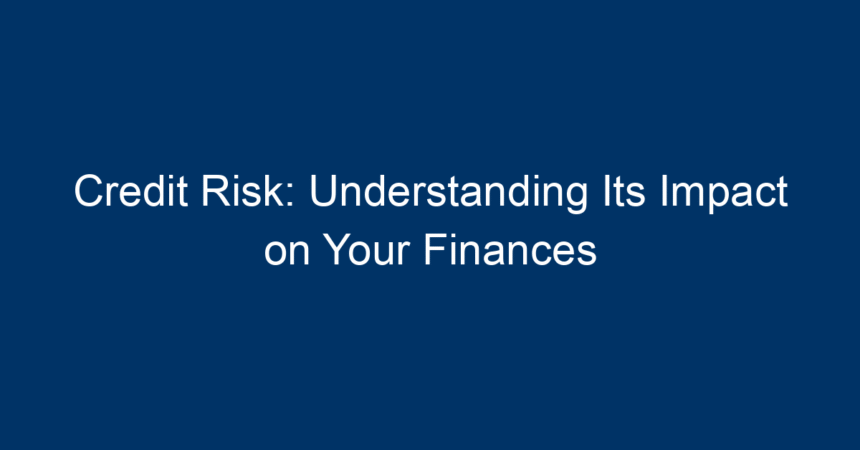In today’s ever-evolving financial landscape, understanding credit risk is essential for both individuals and businesses. It’s a term that often comes up in discussions about loans, mortgages, and investment strategies, but what does it really mean? This article aims to demystify credit risk, examining its impact on your financial health, investment decisions, and overall economic wellbeing.
What is Credit Risk?
Credit risk refers to the potential that a borrower will fail to meet their obligations in accordance with agreed terms. In simpler terms, it means the risk that your lender may not receive the money back that they loaned you. This risk is crucial for banks and financial institutions, as it can significantly influence their operating profits and growth prospects.
Types of Credit Risk
Credit risk can manifest in several forms, including:
-
Individual Credit Risk: Relates to individuals who borrow money. Factors like credit score, income, and repayment history come into play here.
-
Corporate Credit Risk: This concerns businesses and their ability to repay loans. A company’s financial health, industry conditions, and market position are all considered.
- Sovereign Credit Risk: Involves the risk of default by a government on its debt obligations, which can affect foreign investors and domestic economies alike.
Understanding these types can help you assess your financial landscape better, allowing for informed decisions.
The Importance of Credit Risk Assessment
Credit risk assessments are crucial for lenders and investors alike. They involve evaluating the likelihood of a borrower defaulting on their loan. Here’s why it’s essential:
For Lenders
-
Mitigating Losses: Effective credit risk assessment helps lenders minimize potential losses from defaults, ensuring healthier profit margins.
- Informed Lending Decisions: By evaluating a borrower’s creditworthiness, lenders can set appropriate interest rates and loan limits, balancing profit potential with risk.
For Borrowers
-
Understanding Your Credit Profile: Credit risk assessments help you understand how lenders view you, giving you insights into your credit score and how to improve it.
- Loan Terms: Knowing your credit risk can help you negotiate better loan terms, potentially saving you money over the life of the loan.
Factors Influencing Credit Risk
Understanding the factors that contribute to credit risk is invaluable for both borrowers and lenders. Here are some key elements:
Credit History
Your credit history is a record of your borrowing and repayment behavior. A stable history with on-time payments will enhance your credit score, reducing perceived credit risk. Conversely, missed payments or bankruptcies can drastically increase credit risk.
Current Financial Situation
A borrower’s current income, assets, and overall financial health play a critical role in assessing credit risk. Lenders will look into your debt-to-income ratio, as a high ratio may indicate you’re over-leveraged.
Economic Conditions
Broader economic conditions, such as unemployment rates and inflation, affect credit risk. In a robust economy, borrowers are likely to comfortably meet their obligations, while economic downturns can increase default rates.
The Impact of Credit Risk on Borrowers
Higher Interest Rates
One of the most immediate impacts of high credit risk is elevated interest rates. Lenders charge higher rates to offset the increased risk they assume when lending to individuals or businesses with poor credit histories.
Limited Access to Credit
Those with high credit risk may find it challenging to secure loans or credit. Many lenders will either deny your application outright or offer loans with unfavorable terms.
Long-term Financial Health
High credit risk can plague your financial health for years. Having a poor credit score can affect your ability to buy a home, secure a car loan, or even land a job, as many employers now check applicants’ credit scores.
The Impact of Credit Risk on Businesses
Operational Constraints
High credit risk can limit a business’s ability to secure loans for expansion or operations, stifling growth opportunities. This can lead to a cycle of underperformance, further increasing credit risk.
Investor Relations
For publicly traded companies, a poor credit rating can deter investors and depress stock prices. Conversely, a good credit rating can enhance investor confidence and market position.
Increased Cost of Doing Business
Businesses with high credit risk often face higher borrowing costs, which can lead to less competitive pricing on products and services, impacting their market share.
Strategies for Managing Credit Risk
For Individuals
-
Monitor Your Credit Score: Regularly check your credit report for errors and understand how your actions affect your score.
-
Pay Your Bills on Time: Establishing a history of timely payments can significantly improve your credit standing.
- Limit New Credit Applications: Multiple inquiries into your credit report can negatively impact your score, so be strategic in your borrowing.
For Businesses
-
Conduct Thorough Credit Assessments: Regularly evaluate the creditworthiness of potential clients to minimize risk.
-
Diversify Revenue Streams: Ensuring a diverse client base can help mitigate risks associated with default.
- Establish Clear Payment Terms: Clear contracts and payment expectations can reduce the incidence of late payments.
Conclusion: Taking Control of Your Credit Risk
Understanding credit risk is vital for anyone looking to maintain their financial health. By grasping the elements that contribute to credit risk—such as credit history, current financial situation, and economic conditions—you can make informed decisions. Both individuals and businesses can implement strategies to manage and minimize credit risk effectively, paving the way for a more secure financial future.
Actionable Insights
-
Educate Yourself: Knowledge is power. Make it a priority to educate yourself about credit risk.
-
Regularly Review Financial Statements: Keeping tabs on your financial situation helps you stay ahead of potential issues.
- Seek Professional Help: If managing credit risk feels overwhelming, consider consulting financial advisors for personalized strategies.
By taking proactive steps and maintaining an acute awareness of your credit risk, you can safeguard your financial future and open doors to better lending opportunities. Understanding credit risk is not just about protecting your money; it’s about empowering yourself for a healthier financial life.



